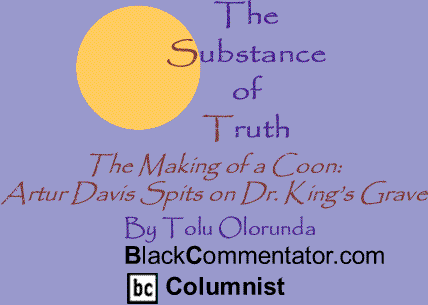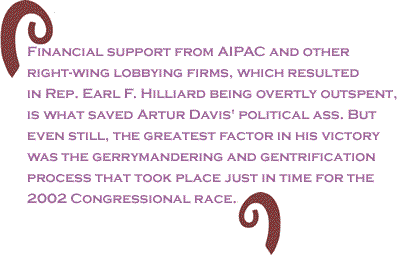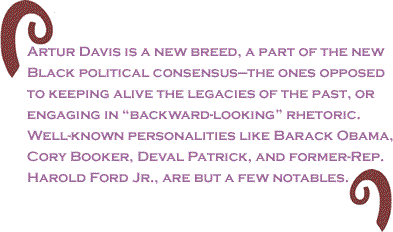
|
|||||||||||||||||||||||

|
|

Custom Search
|
|
 |
|
Dr. King couldn’t be more displeased. His tireless years of pumping blood into the heart of the Black freedom struggle, Selma, Alabama, might have given life to one of the most knee-jerk, reactionary, ultra-conservative, malicious Black politicians of our time — Congressman Artur Davis. Davis is a budding Black figure, representing Alabama’s 7th Congressional District. He rose to prominence in 2002, following a Congressional victory over former-Rep. Earl F. Hilliard. Davis’ accomplishment, however, was more or less a fruit of the poisoned tree. Refusing to run on issues affecting Alabama’s black constituency, he instead presented his candidacy as a generational shift from the old to the new. But even this cynical ploy failed as a deal-breaker. Financial support from AIPAC and other right-wing lobbying firms, which resulted in Hilliard being overtly outspent, is what saved his political ass. But even still, the greatest factor in his victory was the gerrymandering and gentrification process that took place just in time for the 2002 Congressional race. Through this unholy scheme, many Black families were displaced, thus siphoning potentially Hilliard-votes. Artur Davis is no friend of the Black community; and none other knew this better than his 2002 opponent. During the thick of the fight, Hilliard reminded his constituency that Davis, as a federal prosecutor, had been anything but an ally of the Black Community: “The only thing he’s done for black people is put them in jail.” Hilliard held no bars in questioning whether Davis was “black enough”—a contention which resonated quite expressively among Alabama’s then-heavily Black-populated 7th Congressional District. Running as a staunch proponent of the Iraq War, and an advocate for charter schools and other education privatization mechanisms, Davis won 56% - 44 %. In spite of this victory, Davis was opposed by several members of the Congressional Black Caucus and Rev. Al Sharpton, who had made stops, during the campaign season, on behalf of Hilliard. They might have figured that if Hilliard handsomely defeated Artur Davis 58% - 34% only two years earlier, some artificial forces were surely at work in his sudden success. They were right.
What he saw was the making of a coon. Artur Davis is a new breed, a part of the new Black political consensus—the ones opposed to keeping alive the legacies of the past, or engaging in “backward-looking” rhetoric. Well-known personalities like Barack Obama, Cory Booker, Deval Patrick, and former-Rep. Harold Ford Jr., are but a few notables.
In its 7 year history, BlackCommentator.com has not taken lightly the threat this “breed” poses to the freedom-movement and justice-struggle of Black people and oppressed people internationally. Its very first issue, “Fruit of the Poisoned Tree: The Hard Rights Plan to Capture Newark NJ,”—published April 5, 2002—aimed at discrediting the illusions current Newark, New Jersey’s Mayor Cory Booker, represented in the minds of the Black electorate. The issue outlined Booker’s conservative, corporate string-pullers—The Bradley Foundation, The Walton Foundation, etc.—and the hopes and aspirations “love-struck racists” had invested in his campaign. Convinced that “If Booker succeeds in becoming mayor of New Jersey’s largest city, the historic enemies of African American dignity will have won a major test of the power of money to confuse and exploit a proud people,” BC concluded: “The millionaires of the Hard Right love this guy, their Chosen African American Under Forty. At his age, Cory will be a blight on the political scene even longer than the rest of the Four Cs (colored conservatives counting cash): Condoleezza, Clarence, and Colin.” Booker lost that election 53% to 47%, but won 4 years later against an opponent he outspent “25 to 1,” raising over $6 million in the process. Ka-Ching! New Jersey has not been the same, ever since. Harold Ford Jr., current chairman of the DLC and disgraced once-Tennessean Congressman, is another “new Black face” BC hasn’t particularly been pleased with. As subject of many Black Commentator articles, Ford has been sufficiently exposed as the war-mongering, pro-privatization, closet neo-con he is. But perhaps his most egregious transgression came about with the erroneous assertion, in 2006, that his BLACK grandmother was, indeed, White. In a cover story published on March 30, 2006, “Rep.
Harold Ford, Jr. Insults His Grandmother and Our People,” BC
diligently refuted his claim that his grandmother was a white passing
for black—a proposition that almost sounds more ahistorical than
offensive. According to the BC The moral threads that weave this new Black political consensus’ interests are desperation, opportunism and, most importantly, disregard for history; which brings us back to Artur Davis. Earlier this year, Davis made headlines for his open letter to the organizers of the annual Selma, Alabama “Bloody Sunday” commemoration. He was upset that Rev. Dr. Jeremiah A. Wright Jr. had been invited as a memorial speaker. Davis was “offended by the vehemence of Wright’s commentaries on race in America.” It would be a “sad irony”, he railed, to “extend a prominent role in that event to the figure whose rhetoric and histrionics at one point imperiled our new President’s campaign.” Speaking at Birmingham Southern College shortly after, he explained: “I don’t want to welcome him and put him on a pedestal in Selma, Alabama on a day we remember what went on at that bridge and how what happened there lead to Barack Obama and the White House.”
So, Rev. Wright was unfit for the job. Give to someone else—someone cooler and calmer. Someone less threatening. Someone less “incendiary”! Give it to him! Thankfully, the organizers made a fool of Davis. They disregarded his pathetic headline-seeking tantrums, and instead, kept the inimitable Rev. Wright in place for the closing ceremony. Soon after, it was made clear why at all Artur Davis had protested Rev. Wright’s appearance. A week or so later, on February 6, 2009, Davis announced his bid for Governor of Alabama. The Rev. Wright controversy was simply the “enhanced standing” he sought to make that candidacy announcement headline-worthy. But he wasn’t done. A couple of weeks back, when a Black Auburn, Alabama, councilman, Arthur L. Dowdell, snatched up confederate battle flags from a graveyard, Artur Davis couldn’t wait to help fan the White supremacist flames being nurtured to roast Councilman Dowdell. In fact, Davis wouldn’t wait for the opportunity to be asked what his opinion was. The Washington bureaucrat traveled all the way to Auburn, just to say these few, though highly revealing, words:
Davis doesn’t mind that his comments have just put in jeopardy the life of a fellow Black man. He could care less that his words could and would be used as fodder by Klan-praising and neo-confederate organizations like the United Daughters for Confederacy (UDC), which, in 2002, terrorized Dr. Jonathan Farley—ultimately running him out of the country (the Brother deserves justice!)—for his remarks that a statue honoring the founder of the Ku Klux Klan was an affront on the humanity of Nashville’s Black, and other humane, citizens. Davis couldn’t feel more at ease, even though Councilman Dowdell’s fate now hangs on the Dixie rope line, courtesy of the young Black governor hopeful. With top 5 financial contributors like Maynard, Cooper & Gale, P.C.; Bradley Arant Rose & White LLP; Genesee & Wyoming; Southern Co, and Weyerhaeuser Co, and 66% of his general funding coming from Political Action Committees (PACs), Davis can sleep soundly like a baby, knowing that his income stream is never threatened, indeed more stimulated, when he publicly disparages or criticizes other blacks who are speaking or acting in ways that upset whites. If Dr. King was alive, Davis would no doubt be one of those lined up to rail against his “radical” outlook from ’65 - ‘68. Davis would have joined the chorus of antagonism that sought to silence this “new” King, who spoke less of dreams and more of realities. Davis would have stolen whatever occasion he found, to question the integrity of the man he, otherwise, claims great respect for. Davis would have passed up no opportunity to grandstand in the way of a scheduled appearance Dr. King was to make in Selma, Alabama, asking organizers to disinvite the anti-war, anti-privatization Civil/Human Rights icon. But the “King of love” is dead—physically—so Davis might not be able to accomplish these life-long dreams; but he nevertheless succeeds in spitting upon, trampling upon, and dancing upon, Dr. King’s grave. BlackCommentator.com Columnist, Tolu Olorunda, is an activist/writer and a Nigerian immigrant. Click here to reach Mr. Olorunda. |
|
Any BlackCommentator.com article may be re-printed so long as it is re-printed in its entirety and full credit given to the author and www.BlackCommentator.com. If the re-print is on the Internet we additionally request a link back to the original piece on our Website. Your comments are always welcome. eMail re-print notice
If you send us an eMail message we may publish all or part of it, unless you tell us it is not for publication. You may also request that we withhold your name. Thank you very much for your readership. |
|
| |
|
| May
14, 2009 Issue 324 |
|
| Executive Editor: Bill Fletcher, Jr. |
| Managing Editor: Nancy Littlefield |
| Publisher: Peter Gamble |
| Est. April 5, 2002 |
Printer Friendly Version
in resizeable plain
text format or pdf
format. |
| Frequently Asked Questions |
 |

|
 |
 |
 |
| |
| |






































